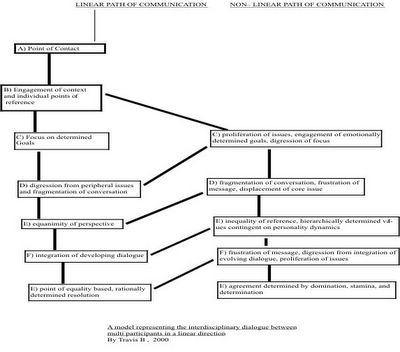
Linear V. Non-Linear Path of Communication.
"Technical morality" taps into the existing framesets of its constituents, us. Similar to our peers, it befriends and negotiates with us in an attempt to persuade its audience to become believers as well as members of its influence. SRL implicitly argues that this "technical morality" usurps and replaces our pre-existing beliefs and values. As this new artificial morality is digested, processed, and integrated into our current mindsets, it becomes more persuasive in directing and developing new modes of thought. We are thus its benefactors as well as its consumers. We eventually learn to contribute to this "technical morality's" development as well as participate in its rabid consumption. This process, which has taken on sentient properties in the respect that it is dynamically responsive to our personal as well as group thought processes, becomes a catalyzing agent and perpetuator of action. Integrated as a natural and biological component of ourselves, this "technical morality" becomes a social matrix not only of the existing cultural and societal structure existing outside of our physical selves, but a psychological matrix that exists and operates within us.
This new artificial morality serves those in power, in both political and corporate positions. It serves to integrate and provide us as a power-base resource for the politicians that want to sell their new self-serving policies to their constituents. It also serves the corporations by persuading us to believe that we need them, want to work for them under any circumstances, as well as consume their products. As a direct and observable representation of "technical morality's" dynamic process, we only have to look at our televisions. The news is contrived to give us sufficient information to keep us occupied while avoiding the real issues at hand[7] . Commercials are produced with the most valuable consumers in mind. Perpetually adjusted and rewritten for optimal efficiency, commercials are based on the operating principle that if the editors can access the viewing audiences internal belief systems in a raw and intrinsically personal way, they can sell us products we do not even need[8].
[7] This premise is essentially similar to arguments made in these texts: Herman, S. Edward and Noam Chomsky. Manufacturing of Consent: the Political Economy of the Mass Media. NY: Pantheon Books, 1988; and Glossner, Barry. The Culture of Fear: Why Americans are Afraid of the Wrong Things. NY: Basic Books, 1999.
[8] See the Frontline Commentary: The Merchants of Cool. Frontline. PBS. Washington. 2001.











No comments:
Post a Comment